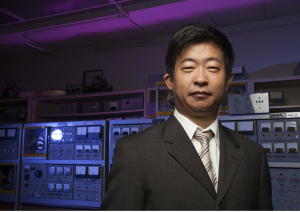It’s no secret that data is everywhere today – endless streams of information are constantly being collected through our smartphones and mobile devices, by sensors placed on bridges and in buildings and even through our smart thermostats and refrigerators.
Finding ways to harness these enormous data sets into useful tools that can aid in decision- and policymaking is now the focus of researchers across the country. Among them is UH electrical and computer engineering Professor Zhu Han, who is part of a team awarded $7.5 million through the Department of Defense Multidisciplinary University Research Initiative (MURI) grant.
Four universities — University of Houston along with the University of California, Los Angeles, University of Maryland at College Park and Princeton University — are joining forces on the five-year project titled “Innovation in Mean Field Game (MFG) Theory for Scalable Computation and Diverse Applications.” UCLA is the lead on the project.
The project is one of 24 MURI awards totaling $169 million announced this year. It brings together a multidisciplinary team of eight experts specializing in a myriad of areas — math, optimization, artificial intelligence, game theory, electrical engineering and psychology.
Han will receive $1.2 million of the award. His research focus includes wireless resource allocation and management, wireless networking and communications, wireless multimedia, security and game theory.
“UH research serves as the bridge between the UCLA theoretical part and the University of Maryland social network part,” Han said. “I’m the translator that can talk with both of them.”
The team will study the use of advanced game theoretical approach – a set of mathematical concepts, theorems and algorithms – to analyze social behavior in the context of large-scale, ultra-dense wireless systems, such as social networks.
“The mean field game, or MFG, is a type of dynamic game that can quantify the behavior of multiple users – billions of users – and analyze it,” Han said. The impact on future networks, including the future of the Internet of Things, could be huge. “It’s difficult to have some type of centralized control, but some kind of theoretical approach may provide guidance on how to have optimal control over future networks.”
The team’s efforts are geared toward accurate modeling of knowledge evolution and opinion formation in social networks, social and culture norm dynamics, socio-economic dynamics in energy consumption and crime modeling, election modeling and psycho/socio/mathematical models of rational and irrational agents. Results of the study will be used for modeling and predicting game outcomes.
According to the project abstract, the researchers hope insights gained will allow the use of MFG Theory in diverse applications, such as crowd control, evacuation planning, urban planning, policy making and more.
In addition to the overall project goal, Han also has a personal goal. “I hope to become a kind of guru in MFG and know how to implement it in many different scenarios, especially social networks,” he said.
The highly competitive MURI program complements other DoD basic research efforts by supporting multidisciplinary teams with larger and longer awards in carefully chosen research topics identified for their potential for significant and sustained progress in areas related to national security and military capabilities.
The list of awards is available on the DoD website.
